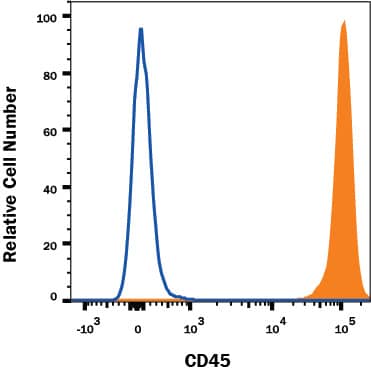Mouse CD45 PE-conjugated Antibody
R&D Systems, part of Bio-Techne | Catalog # FAB114P


Key Product Details
Species Reactivity
Applications
Label
Antibody Source
Product Specifications
Immunogen
Specificity
Clonality
Host
Isotype
Scientific Data Images for Mouse CD45 PE-conjugated Antibody
Detection of CD45 in Mouse Splenocytes by Flow Cytometry.
Mouse splenocytes were stained with Rat Anti-Mouse CD45 PE-conjugated Monoclonal Antibody (Catalog # FAB114P, filled histogram) or isotype control antibody (Catalog # IC013P, open histogram). View our protocol for Staining Membrane-associated Proteins.Applications for Mouse CD45 PE-conjugated Antibody
Flow Cytometry
Sample: Mouse splenocytes
Formulation, Preparation, and Storage
Purification
Formulation
Shipping
Stability & Storage
- 12 months from date of receipt, 2 to 8 °C as supplied.
Background: CD45
CD45, previously called LCA (leukocyte common antigen), T200, or Ly5 in mouse, is member C of the class 1 (receptor-like) protein tyrosine phosphatase family (PTPRC) (1, 2). It is a variably glycosylated 180-220 kDa transmembrane protein that is abundantly expressed on all nucleated cells of hematopoietic origin (1-3). CD45 has several isoforms, expressed according to cell type, developmental stage and antigenic exposure (1-5). The longest form, CD45RABC (called B220 in mouse), is expressed on B lymphocytes (5). The mouse CD45RABC cDNA encodes 1291 amino acids (aa), including a 23 aa signal sequence, a 541 aa extracellular domain containing the splicing region, a cysteine-rich region and two fibronectin type III domains, a 22 aa transmembrane sequence, and a 705 aa cytoplasmic domain that contains two phosphatase domains, D1 and D2. Only D1 has phosphatase activity. CD45R0 is the shortest form, lacking exons 4, 5 and 6 which encode aa 30-169. It is expressed on memory cells, while intermediate sizes are expressed on other T cells (3, 4, 6). CD45 has been best studied in T cells, where it determines T cell receptor signaling thresholds (3, 6-8). CD45 is moved into or out of the immunological synapse (IS) membrane microdomain depending on the relative influence of interaction with the extracellular galectin lattice or the intracellular actin cytoskeleton (9, 10). Galectin interaction can be fine-tuned by varying usage of the heavily O-glycosylated spliced regions and sialylation of N-linked carbohydrates (4, 9). Within the IS, CD45 dephosphorylates and negatively regulates the src family kinase, LCK (8-10). In other leukocytes, CD45 influences differentiation and links immunoreceptor signaling with cytokine secretion and cell survival, partially overlapping in function with DEP-1/CD148 (11-14). CD45 deletion causes severe immunodeficiency, while point mutations may be associated with autoimmune disorders (6, 7).
References
- Anderson, J.N. et al. (2004) FASEB J. 18:8.
- Streuli, M. et al. (1987) J. Exp. Med. 166:1548.
- Hermiston, M.L. et al. (2003) Annu. Rev. Immunol. 21:107.
- Earl, L.A. and L.G. Baum (2008) Immunol. Cell Biol. 86:608.
- Ralph, S.J. et al. (1987) EMBO J. 6:1251.
- Falahti, R. and D. Leitenberg (2008) J. Immunol. 181:6082.
- Tchilian, E.Z. and P.C.L. Beverley (2006) Trends Immunol. 27:146.
- McNiell, L. et al. (2007) Immunity 27:425.
- Chen, I-J. et al. (2007) J. Biol. Chem. 282:35361.
- Freiberg, B.A. et al. (2002) Nat. Immunol. 3:911.
- Zhu, J.W. et al. (2008) Immunity 28:183.
- Huntington, N.D. et al. (2006) Nat. Immunol. 7:190.
- Hesslein, D.G. et al. (2006) Proc. Natl. Acad. Sci. USA 103:7012.
- Cross, J.L. et al. (2008) J. Immunol. 180:8020.
- Ledbetter, J.A. and L.A. Herzenberg (1979) Immunol. Rev. 47:63.
Long Name
Alternate Names
Gene Symbol
Additional CD45 Products
Product Documents for Mouse CD45 PE-conjugated Antibody
Product Specific Notices for Mouse CD45 PE-conjugated Antibody
For research use only